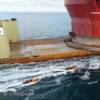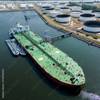Following the success of Naval Sea Systems Command Littoral and Mine Warfare Office funded tests, Art Anderson Associates is moving ahead to design what may be the most mission-effective police and security vessel to date. Under our SBIR Phase I research project for U.S. Military insertion craft, its patented STOLKRAFT hull-form set new standards for rough water rides in five and six foot seas at full-speed. Law enforcement and security agencies, like the U.S. Navy, require high speed, stable platforms that can safely deliver their passengers physically ready to perform rescue, diving and enforcement operations, which is why Art Anderson Associates put the STOLKRAFT hull through such rigorous testing.
The mono-hull vessels currently used by the U.S. Navy are typically being loaded beyond each boat’s capacity and as a result, the boats are underpowered and require more frequent maintenance. Sea motions and shock/slamming are proportionately increased at higher speeds creating platform instability. Studies have shown that hull slamming, and thus fatigue and the probability of injury, can be minimized by the use of alternative hull-forms and/or technology to reduce the transmission of shock loads through the vessel’s structure. The STOLKRAFT is one such hull-form.
The STOLKRAFT set new standards for rough water rides at full speed during testing in the Straits of Juan de Fuca in Washington State. Art Anderson Associates instrumented a 30-foot STOLKRAFT test vessel to measure the slamming effects on the passengers and was able to show a significantly greater roll stability and up to sixty-four percent less slamming than the U.S. Navy’s current 10 meter RHIB, as well as a much lower wake than comparably sized vessels. A sister vessel of the test boat is located in the Bremerton Marina where the firm continues to test design characteristics and provide client demonstrations.
The objective of this SBIR is to develop a 40 to 50 knot patrol craft, approximately 30 feet in length, with a large deck area that allows for over the transom rescue capability. Other features include a simple, beachable twin hull and a roomy interior to accommodate rescue operations.
Sponsored Content
Innovative Hull Maintenance: Profitable & Green

Subscribe for
Maritime Reporter E-News
Maritime Reporter E-News is the maritime industry's largest circulation and most authoritative ENews Service, delivered to your Email five times per week













